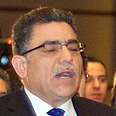
Syrian opposition in disarray
As Assad gradually loses grasp of Syria, number of top opposition figures resign; rebels unable to organize, consolidate military, political bodies into cohesive movement
Syria's opposition plunged into disarray Sunday as its president quit and its military chief refused to recognize the newly elected prime minister of an interim government for rebel-held areas.
The moves reflected deep splits in the body the US and its allies hope will emerge as the united face of the opposition and advance the fight to topple President Bashar Assad 's regime.
Related stories:
- Syrian opposition source: Rebels no threat to Israel
- Report: No chemical weapons used in Syria
- Report: CIA provides intelligence to Syrian rebels
The missteps of the opposition's mostly exiled political leadership drew little notice inside Syria, where rebel fighters dismissed it as ineffective and pushed ahead with their offensive to gain ground near the country's southern border with Jordan.
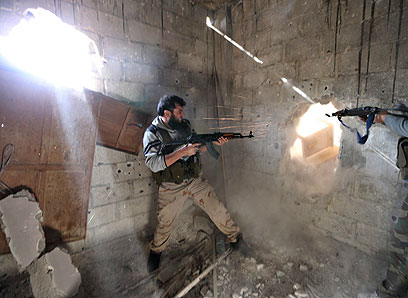
Fighting in Damascus (Photo: Reuters)
The first blow to the opposition Syrian National Coalition was the surprise resignation of its president, who said he was quitting in frustration over what he called lack of international support and constraints imposed by the body itself.
Mouaz al-Khatib, who rose to prominence as a preacher in Damascus' most famous mosque, said in a statement posted on his Facebook page that he was making good on an earlier vow to quit if undefined "red lines" were crossed.
"I am keeping my promise today and announcing my resignation from the National Coalition so that I can work with freedom that is not available inside the official institutions," he said.
He also blamed world powers for not offering Syria's rebels the support they demand and complained that "international and regional parties" tried to push the Coalition toward negotiations with the Assad regime - something most members refuse.
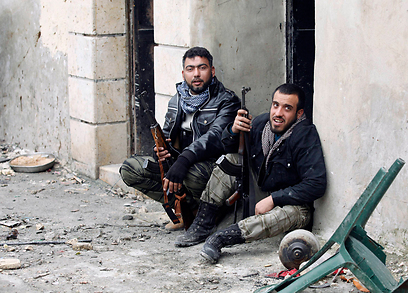
Rebels in Syria (Photo: Reuters)
Despite the election of a US-educated prime minister last week to head a planned interim government, the Coalition has failed to make much of a mark inside Syria, where hundreds of independent rebel brigades are fighting a civil war against Assad's forces.
Reflecting the growing dissension over that move, the head of the Coalition's military branch, Gen. Salim Idris, said his group refused to recognize the new prime minister, a little-known IT professional from Texas, because he lacked broad support among the opposition.
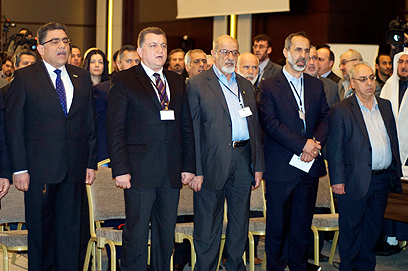
Syrian opposition (Photo: MCT)
"For the purpose of giving power to a prime minister to unite the revolutionary forces and lead the Syrian revolution toward certain victory, we unequivocally declare that the Free Syrian Army ... conditions its support and cooperation on the achievement of a political agreement on the name of a prime minister," Idris said in an online video.
An aide to Idris, Louay Almokdad, said many prominent Syrian opposition figures opposed the election of Ghassan Hitto, who received 35 out of 48 votes cast by the Coalition's 63 active members.
While al-Khatib's resignation surprised many Coalition members, some said it reflected problems that have caused five other members to resign in the past week.
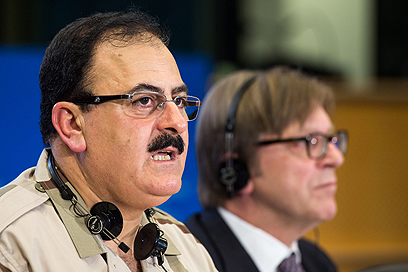
Gen. Salim Idris (Photo: AP)
"We have problems internally with the structure of the Coalition and decisions being taken undemocratically," Coalition member Rima Fleihan said.
Another recently resigned member, Walid al-Bunni, accused the Gulf state of Qatar, which heavily finances the opposition, of using pressure to install its candidate for prime minister. Others have accused the Muslim Brotherhood of exercising outsized influence.
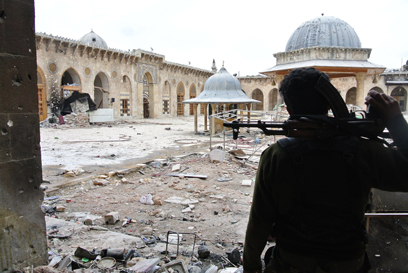
Aleppo mosque in ruins (Photo: AP)
Late Sunday, the Coalition distributed a statement saying it had rejected the resignation and asked al-Khatib to hold on to his post.
Secretary of State John Kerry said he regretted al-Khatib's resignation, but said it won't affect US aid to the Coalition.
In a small victory for the opposition, senior Arab diplomats said they would transfer Syria's seat at the Arab League to the Coalition. The Syrian government's membership was suspended earlier in the crisis. The Coalition said it would send a delegation to a league summit that begins Tuesday in Qatar.
The Syrian government, which contends the civil war is an international conspiracy being carried out by terrorists to weaken Syria, did not comment on the Coalition developments. Instead, it hosted a "National Dialogue Forum" in Damascus that included none of the forces seeking Assad's ouster.
Few of the rebels inside Syria paid any attention to the exile opposition's problems, saying the Coalition had never done much for them anyway.
"All this stuff that happens outside never makes any difference to us," rebel fighter Firas Filefleh said via Skype from the northern province of Idlib. He said he and his colleagues respect al-Khatib as a religious figure but that he and the Coalition were ineffective.
"The Coalition has never made any difference for the fighting brigades," he said. "They brought some flour and some canned goods but have never done more than that."
Filefleh said he had no opinion of Hitto and said he had never heard of Gen. Idris, who purports to be the rebels' highest military leader.
The Syrian government, which contends the civil war is an international conspiracy being carried out by terrorists to weaken Syria, did not comment on the Coalition developments. Instead, it hosted a "National Dialogue Forum" in Damascus that included none of the forces seeking Assad's ouster.
- Receive Ynetnews updates directly to your desktop










